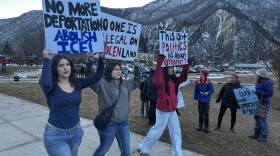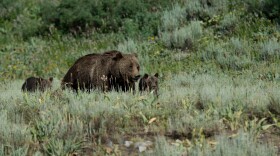-
The move scrambles Colorado’s healthcare landscape, amplifying fear for immigrants and institutions providing care.
-
Scott Socha is an executive at Delaware North, a company that contracts with the National Park Service to provide lodging and food at several national parks.
-
Ace of spades playing cards were left in abandoned vehicles last month after U.S. Immigration and Customs Enforcement detained the drivers, according to a Glenwood Springs-based Latino advocacy nonprofit. The cards have historically been used as an intimidation tactic.
-
The states with Democratic AGs argue that federal agencies are side-stepping important environmental laws to carry out the executive order.
-
A yearslong effort by some local residents to remove or restrict kids' access to certain adult books from Garfield County's public libraries has been largely unsuccessful so far, but with the recent appointment of two new library trustees by the county commissioners and the library district's executive director about to retire, changes could still be coming.
-
A journalist and Carbondale local, Stewart Huntington, traveled back to his hometown of Minneapolis last month to report on ICE activities and local resistance efforts.
-
Last year, lawmakers turned to the Congressional Review Act to overturn Biden-era resources plans. Now, the tool is being looked at to unwind other public lands management actions.
-
Glenwood Springs High School closed on Friday after too many teachers called out to join a national day of action protesting ICE activity in Minneapolis. Students from Carbondale also walked out of school to protest on Main Street.
-
Advocates worry this delay could signal a future attempt from the Trump administration to take grizzlies off the endangered species list.
-
As Basin state governors met in Washington D.C., to try and break the impasse, Colorado’s Attorney General said the state has a deep bench of lawyers to contend with multiple water disputes.
-
Four days of negotiations in a Salt Lake City conference room earlier this month did not appear to have sparked a breakthrough.
-
















